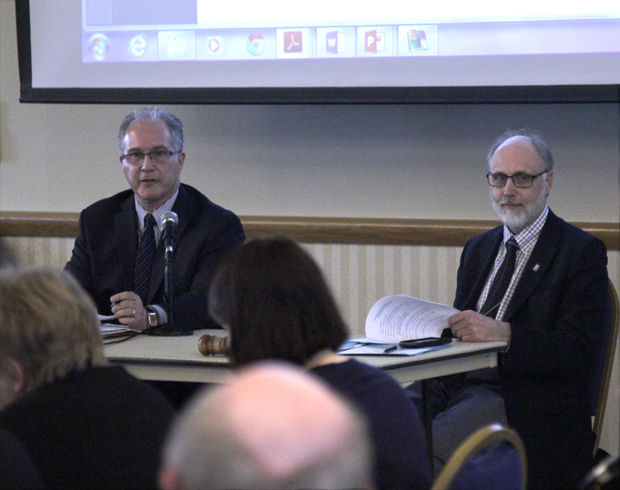Taxes may increase due to budget impasse: Baker
NIU President Doug Baker (left) and Greg Long, executive secretary of University Council, discuss the current budget issues NIU is facing due to the continued state budget impasse Wednesday at a University Council meeting in the Holmes Student Center, Sky Room.
April 7, 2016
The state may be looking into tax increases as the budget impasse extends to more than nine months, said NIU President Doug Baker at a University Council meeting Wednesday.
The budget impasse is due to a lack of agreement between the state legislature and Gov. Bruce Rauner on a Fiscal Year 2016 budget. Without a finalized budget, state appropriations, which accounted for 22 percent of NIU’s FY 15 budget, cannot be given out. Baker said he had went down to Springfield on Monday and Tuesday to discuss the budget impasse.
“There was agreement that we need to have a tax increase in some form… there was also an understanding that there needed to be budget reduction,” Baker said.
Rep. Bob Pritchard (R-Hinckley) said the state needs revenue to get the budget moving and that there have been many solutions discussed including tax increases.
“Certainly revenue is being talked about and cutbacks in some areas are being talked about but there is not a lot of movement at the moment on the budget,” Pritchard said. “I’m just sensing that enough people are realizing that we’re going to [need] a budget by the end of May.”
Pritchard said there is the possibility of combining a FY 16 and FY 17 budget because there are no revenue sources for FY 16.
NIU budget status comparison
“There was [an] understanding on both sides, in rank and file legislators, that this is really, really bad for higher education, at all levels, community colleges, at universities, for students, faulty and staff, there is a real understanding,” Baker said.
Schools such as Chicago State University have been faced with potential closure.
Parkland College in Champaign has started making a budget with no state appropriations and will shrink their size to fit their budget, said Paul Stoddard, the NIU Faculty Advisory Council representative to the Illinois Board of Higher Education.
NIU has sufficient funds to make it through spring 2017 but has seen two credit ratings drop during the budget impasse, both times NIU’s reliance on the state budget were cited as the main factor.
A credit rating assesses the creditworthiness of any entity attempting to borrow money, according to Investopedia.
About 5,700 NIU students also saw no appropriations from the Monetary Award Program grants, amounting to $20 million, which NIU originally credited.
If there is no state allocation for NIU MAP students, they will have to pay back the credits they accepted because NIU is not in a position to cover those funds, said Alan Phillips, vice president of Administration and Finance, at a Feb. 16 Town Hall meeting.
Baker said in his discussion with legislators there was never a question about fully funding MAP.







